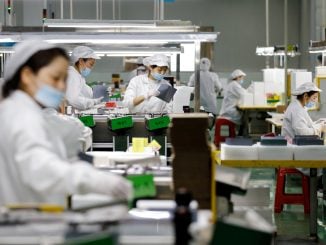The director of the FBI and the head of Britain’s MI5 security service recently made an unprecedented joint appearance to warn the world of a singular danger.
Speaking to business leaders in London, they warned that the Chinese government poses the biggest long-term threat to the economic and national security of the United States, Great Britain and their allies.
FBI Director Christopher Wray described a lawless, stop-at-nothing Chinese government agenda to steal competitors’ intellectual properties and using these to dominate global markets. MI5 chief Ken McCallum called China’s threat “game-changing.”
They both made clear that Beijing aims to undercut and usurp the world’s leading companies in strategic technology sectors — among them aerospace, biotech and artificial intelligence.
Unfortunately, as the FBI works to counter this threat, it’s up against not just China but the U.S. government itself.
That may sound surprising. But in June, the Office of the U.S. Trade Representative joined other WTO members to pass a measure that will waive patent rights related to COVID-19 vaccines.
This decision allows developing countries to ignore their obligations under the WTO’s Agreement on Trade-Related Aspects of Intellectual Property Rights (TRIPS) — and seize intellectual property without the rights holder’s consent.
Under WTO rules, China counts as a “developing country.” An early draft of the agreement would have barred China from taking advantage of the waiver, based on its enormous vaccine exports. But during debate leading up to the WTO decision, the Chinese government lobbied member countries to remove language that would have excluded it. In the final version, China is simply “encouraged” not to avail itself of the waiver.
In short, the world has been asked to trust Beijing regarding vaccine IP. But as Wray and McCallum made clear, it isn’t a trustworthy partner.
And China’s good fortune doesn’t stop there. WTO member countries are considering extending the IP waiver from vaccines to COVID-19 diagnostic tools and treatments.
Expanding the waiver further will only expedite China’s plans to undercut U.S. and European companies, control supply chains and dominate the biopharmaceutical industry.
It’s critical that WTO member countries wake up to China’s not-so-secret plan. As Wray warned in London, “It may be a lot cheaper to preserve your intellectual property now than to lose your competitive advantage and have to build one down the road.”
The United States has already lost its competitive advantages in technology and manufacturing for many product categories, including cutting-edge vanadium redox flow batteries. China is now the world’s largest manufacturer of these high-performance batteries, using technology developed at U.S. national laboratories.
As NPR recently reported, this major loss was due in part to the Department of Energy “violating its own licensing rules while failing to intervene on behalf of U.S. workers in multiple instances.”
Director Wray was speaking to private sector businesses, but his message is just as relevant for leaders of democratic countries. China’s nefarious tactics are easy to see; the last thing we should do is willingly hand Beijing the keys to our castles. Protecting intellectual property is about more than profitability — our innovations, economic competitiveness and national security are at stake.
Walter G. Copan, Ph.D., is vice president for research and technology transfer at Colorado School of Mines, and senior adviser with the Center for Strategic and International Studies and co-founder of its Renewing American Innovation project.



